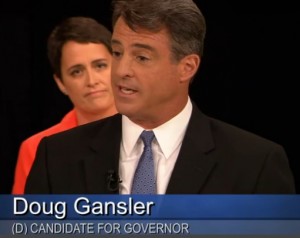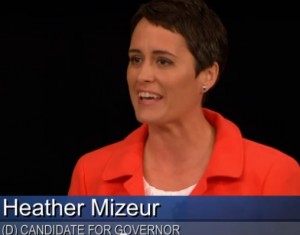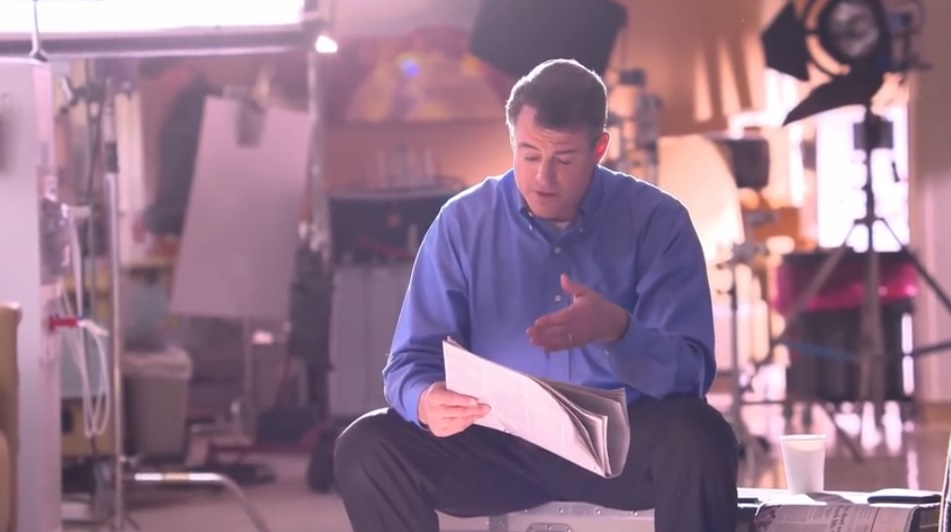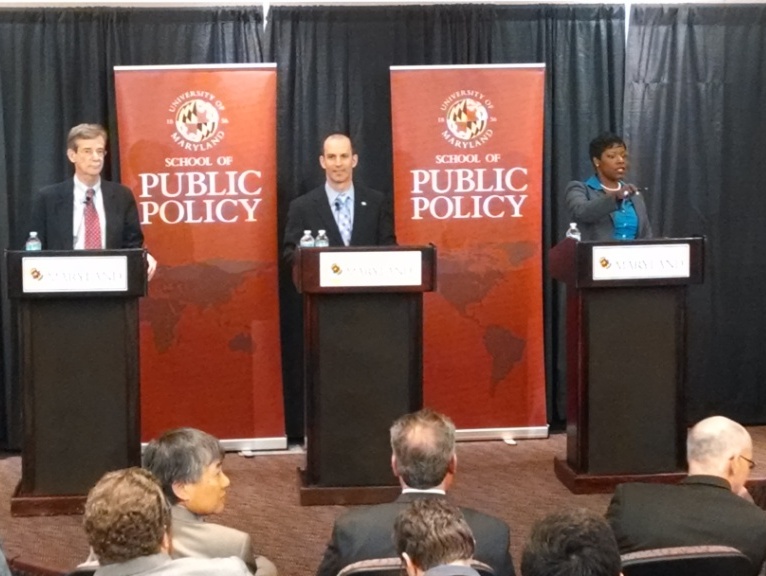Rascovar: Rushing toward the June 24 primary
For MarylandReporter.com
With two weeks to go till Maryland’s June 24 primary for governor, here’s where we stand on the all-important Democratic side.
Televised debates, all three of them, are over, as is the one and only radio debate among Lt. Gov. Anthony Brown, Attorney General Doug Gansler and Del. Heather Mizeur.
The good news for Brown: he didn’t make any major blunders – though he took a deserved pounding for ducking the second debate.
Brown came across best on the 90-minute WOLB-AM radio confrontation, heard mainly by an early-morning, African-American audience in both the Baltimore and Washington areas.
‘Cool’ vs. ‘Hot’

Lt. Gov. Anthony Brown addresses the MPT studio audience as Del. Heather Mizeur and Attorney General Doug Gansler listen.
As Marshall McLuhan pointed out after the first presidential debates (Nixon vs. Kennedy in 1960), radio is a “cool” medium, while television is a “hot” medium. On radio, people listen more closely and judge candidates on what they say; TV presents viewers with both a visual and a spoken image that can be difficult for candidates to reconcile.
Brown clearly isn’t comfortable under harsh TV lights. He’s more at ease before a radio microphone.
In both the third TV debate and the lone radio debate, Brown harped on achievements of the past eight years and the need to continue progressive reforms. He repeated time and time again, “more work to do” and “we can do better.”
Gansler is separating himself as the lone critic of the O’Malley-Brown years: 40 new or expanded taxes, a machine-like party establishment of special interests seeking Brown’s coronation and the need for change in Annapolis.
He won the third debate. He was much more fluent, more relaxed and less hesitant. He made contact directly with his studio audience.
His theme: jobs, jobs, jobs.
Turning negative
 Gansler also was combative in trying to bring Brown, the apparent leader in this campaign, down a notch.
Gansler also was combative in trying to bring Brown, the apparent leader in this campaign, down a notch.
On TV, he said Brown “has an uncomfortable relationship with the truth.” On radio, he told listeners Brown and Gov. Martin O’Malley “failed you and failed Baltimore” while Brown “ran away” from Maryland’s embarrassing health exchange debacle.
Brown and his camp have not hesitated to make far nastier charges against Gansler in their statements and in their ads.
The third candidate, Mizeur, continues to promote a far-left agenda that appeals to segments of Maryland’s liberal Democratic Party. Her polite, demure attitude, a well-delivered summary of her goals and her refusal to join Brown and Gansler in tit-for-tat criticisms helped her immensely in these debates.
Mizeur: Pro and con
 Of the three, she is the most hostile to businesses and the wealthy. She has excoriated shale-oil fracking, millionaires, chicken farmers, a natural gas export plant in Southern Maryland and any thought of a tax cut for corporations or a reduced estate tax.
Of the three, she is the most hostile to businesses and the wealthy. She has excoriated shale-oil fracking, millionaires, chicken farmers, a natural gas export plant in Southern Maryland and any thought of a tax cut for corporations or a reduced estate tax.
She’s in favor of legalized marijuana, universal pre-kindergarten for four-year-olds and three-year-olds, state subsidized child care, a living wage of $16.70 an hour, tax cuts for the middle class, tax breaks for small businesses, an end to income inequality and campaign finance reform.
How she pays for her proposals is an exercise in hype and gross exaggeration.
Because the vast majority of voters don’t watch debates, much will depend on the impact of TV ads.
TV advertising
Brown has the most money to throw into a TV blitz, but Gansler isn’t far behind. Mizeur’s bankroll is dwarfed by the others and thus you won’t see many ads from her.
So far the best commercials belong to Gansler. His silent ad (no words, just music) slamming Brown for his debate no-show was unusual and effective in getting viewer attention. His ad in which he casually reads from critical Brown editorial comments in the Washington Post about Brown’s failings in the health exchange disaster is another winner.
Brown’s numerous commercials, meanwhile, are slick and well conceived but lack potency. The ads avoid specifics and stick to feel-good generalities.
While Gansler may be winning the ad war and gaining in later debates, he’s got an uphill road ahead of him.
Among Democrats, the governor remains fairly popular, which rubs off on his lieutenant governor.
Gansler is bucking nearly the entire Democratic Party establishment at a time when the call for change is coming mainly from Republicans.
His hopes are further diminished by Mizeur’s presence. The anti-Brown, anti-O’Malley, “it’s time for a change” vote will be split between Gansler and Mizeur.
Attorney general’s race
Meanwhile, in the other contested statewide Democratic race, state Sen. Brian Frosh is gaining momentum as state Del. Jon Cardin keeps slipping. The third candidate, Aisha Braveboy, isn’t a contender.
What Cardin has going for him is his last name. He’s counting on voter confusion and the popularity of his Uncle Ben, Maryland’s United States senator.
But Jon Cardin is proving his own worst enemy.
He missed 75 percent of committee votes in the legislature this year — an inexcusable act — that Frosh is using effectively to show that Jon C. is not ready for prime time.
Criticism back home
An extraordinary coalition of former state senators and a councilwoman from Cardin’s own Jewish community in northwest Baltimore County and city condemned Jon C.’s failure to take his legislative duties seriously. They criticized his “lackluster career.”
Then Jon Cardin promoted an endorsement from a Baltimore-based rap artist — only to discover Ski Money is facing multiple charges of human trafficking. The candidate’s later denunciation and rejection of that endorsement just drew attention to Jon Cardin’s stumble.
Even worse, the No.1 Democrat in Maryland, Martin O’Malley, attended a Frosh event in Greenbelt and warmly endorsed the Montgomery County senator. The party’s big guns are lining up solidly behind Frosh.
The state senator also has a growing advantage in fund-raising. He received a strong endorsement from the Washington Post and likely will get the nod from the Baltimore Sun as well.
While early 2014 polls showed Cardin with a large lead, his odds of winning are rapidly diminishing.
Jon C. may yet gain the Democratic nomination, but only if people go to the polls believing they’re voting for the other Cardin.
Barry Rascovar’s writings can also be found at his blog site, www.politicalmaryland.com.

MarylandReporter.com is a daily news website produced by journalists committed to making state government as open, transparent, accountable and responsive as possible – in deed, not just in promise. We believe the people who pay for this government are entitled to have their money spent in an efficient and effective way, and that they are entitled to keep as much of their hard-earned dollars as they possibly can.


